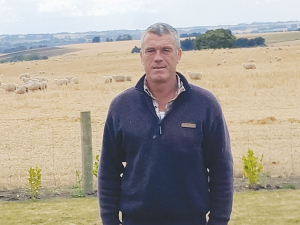Former Federated Farmers Meat and Wool chair Miles Anderson has been selected as the National Party candidate for the Waitaki electorate.
The fifth of eleven children, Anderson was educated at the local Southburn primary school, then at St Kevin's College boarding school in Oamaru. In 1992 he became involved with a group of local farmers establishing a business scanning livestock for pregnancies in the central South Island, with eventual expansion into South Australia.
Taking over the 220 hectare family farm in Southburn from his father in 2004, Anderson runs 1,500 sheep and about 20 beef cattle, with 10-80 hectares dedicated to cereal crops.
Before entering politics some of Anderson's former roles included the aforementioned chair of Federated Farmers Meat and Wool sector - formerly Meat and Fibre. Anderson had it renamed to boost wool's profile in New Zealand.
As part of the Meat and Wool group some of his accomplishments included amendments to the Crimes Act, introducing harsher penalties for stock rustling and collaboration with the Stock Station Agents Association New Zealand to bring in code of practice for stock and station agents.
Outside of Federated Farmers, Anderson is part of Pareora Catchment Group Inc, a group of landowners instigating programmes to improve the catchment's water quality and maintaining habitats for native species to leave a legacy for the next generations to work on, as well as spearheading an Environment Court challenge against Transpower in Waimate, setting a standard for the rest of the country for landowners' property rights.
Although Waitaki is generally considered a strong blue holdout, Anderson says that he would be a fool to take it for granted.
"I'm going to get out and make myself known to the electorate, articulate the policy differences between the parties and talk about the economic direction New Zealand is going in," he told Rural News. "If I'm fortunate enough to win in October, I'll be fighting for issues that are not only specific to the rural electorate, but to Waitake as a whole."
Anderson says that Waitaki's wide range of sectors - agriculture, tourism, mining etc - was "awe-inspiring".
"I want to make sure this electorate gets heard and the next generation can have the opportunities I had to forge their own lives without government interference."
Although Anderson is confident National will win the electorate in October, he says either way he will be fighting for the people of Waitaki.
"If I was to win this electorate and Labour forms the government, I would still fight for all the electorate's community and individual issues. I really believe it'll be a complete basket case in 3 years if we get another 3 years of a Labour government," he says.
"Local decisions that used to be made here are getting dragged up to Wellington; politicians believe they know better than locals who deal with these issues on a daily basis."
After being selected as National's candidate in February, Anderson says that one of the main things he wants to get done is get the best team together.
"I'm really excited that we've got a very good team lined up behind our campaign for the next 8 months," he proudly says. "You need comms, a campaign chair, a diary manager, social media guru, a kick my butt if I'm not doing things right person. I trust all the people I've brought together."



















